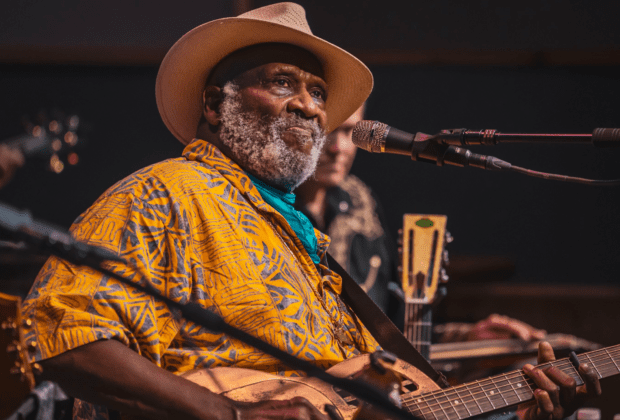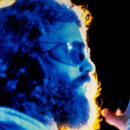Legendary roots star Taj Mahal is to be honored at the Recording Academy®’s Special Merit Awards Ceremony, receiving a Recording Academy Lifetime Achievement Award, alongside fellow honorees Frankie Beverly, The Clash, Dr. Bobby Jones, Prince, Roxanne Shante, and Frankie Valli. The ceremony celebrating the 2025 Lifetime Achievement Award, Trustees Award, and Technical GRAMMY® Award recipients will return during GRAMMY® Week on Feb. 1, at the Wilshire Ebell Theatre.
Taj Mahal also received a GRAMMY nomination for Best Traditional Blues Album for Swingin’ Live at the Church in Tulsa, a dynamic live album, released via Lightning Rod Records. Taj also received a nomination for Best American Roots Performance for “Nothing In Rambling” by The Fabulous Thunderbirds, Featuring Taj alongside Bonnie Raitt, Keb’ Mo’, & Mick Fleetwood.
Swingin’ Live at the Church in Tulsa is his latest project and an extraordinary set recorded live at the Tulsa studio. The studio is best known as the home base of Shelter Records and the late, great Leon Russell, a huge influence on and personal friend of Taj. The ten songs reach across multiple genres that he has explored in his incomparable career and feature “The Taj Mahal Sextet,” which includes Taj’s long-time quartet—bassist Bill Rich, drummer Kester Smith, and guitarist/Hawaiian lap steel player Bobby Ingano—augmented by dobro player Rob Ickes and guitarist and vocalist Trey Hensley.
The album has received high praise from SPIN, American Songwriter, No Depression, Riff Magazine, Folk Alley and more, with No Depression exclaiming: “It’s like hearing the voice of God. He commands your attention, a mix of the stern Old Testament God laying down the law and the New Testament one inviting sinners to gather round and learn something while they get cleansed.”
At 82 years old, Taj can easily claim musical legend status. He has four Grammy Awards to his name (out of seventeen nominations), alongside a lifetime of other achievements and a career spanning six decades, releasing nearly 50 albums, Taj is both an architect and custodian of the roots music sound. Proficient in 20 different instruments and a serial collaborator, Taj has worked with musicians including the Rolling Stones, Etta James, Angelique Kidjo, Ziggy Marley, and more. There are few musicians that Taj’s music has not touched.
“Some of us were gifted by our ancestors to be in a long line of musicians,”says Taj Mahal. “It's in your DNA. Others are lucky to find it and put in the dedication that it takes to be able to get there. So that’s my life as an 82-year-old—still playing music, still enjoying it, still getting to do the things I want to do.”
Constructed in 1915 as Grace M.E. Church, the Church Studio was purchased by Russell in 1972, who converted it into a recording studio / office for his famed Shelter Records label, which became a creative home to artists including, Tom Petty & the Heartbreakers, Eric Clapton, The Gap Band, JJ Cale, Jimmy Buffett, Willie Nelson, and Stevie Wonder, among others. Now listed on the National Register of Historic Places, current owners Ivan Acosta and Teresa Knox completed their renovation of the space in 2022 bringing it back to life as an analog recording studio, including a NEVE 8068 console and a museum-quality vintage microphone collection. The historic studio is dedicated to showcasing the legacy of the “Tulsa Sound” and creating opportunities for the next generation of musicians.
Taj first became aware of Oklahoma’s central role in American music through a family friend named James Brewer. “He was one of the coolest guys that we ever met,” says Taj. “Dressed sharp all the time, played alto a little bit with those territory bands out there like Ernie Fields and Bennie Moten.” Later, he solidified a connection to the region’s musicians through guitarist and close collaborator Jesse Ed Davis, who introduced him to such Tulsa-based players as JJ Cale, Bobby Keys, and, eventually, the force of nature known as Leon Russell.
Tulsa holds rich and tragic historical significance to Black history and culture. It was a hotbed for jazz and blues, with Tulsa being a stop on the famed Chitlin’ Circuit and home to the Greenwood neighborhood known as Black Wall Street due to its thriving Black community, Black businesses, and home to roughly 10,000 residents. It was all destroyed in the Tulsa Race Massacre of 1921, where a white mob killed hundreds of residents, burned more than 1,250 homes, and erased years of Black success in the area.
“A lot of the people that caused that Massacre to happen were highly unevolved human beings,” stated Taj, “Unfortunately, this country didn't start with the best of people; some of them didn't have brains above their ankles, and they did not know how to handle the success of people they viewed as relegated to the bottom of society. Fortunately, there has been a tremendous amount of music and art to come out of the state of Oklahoma, and there's a great, diverse population that's there. The people have tried to make their way, and there's been some progress that has been slow. Clearly and obviously, people have been working to evolve themselves past those kinds of ugly examples of what human beings can do, to and with, and against one another. Let's hope that the lesson from that doesn't fall on deaf ears and that we continue to evolve.”
The album was recorded in front of a live audience, features Taj’s Sextet, and continues his legacy of confounding genres where he has pioneered an eclectic roots music sound that draws on Blues, Soul, reggae, Latin, R&B, Cajun, Caribbean, gospel, West African, jazz, calypso, Hawaiian slack-key, and countless other musical styles that he weaves throughout an astonishing body of work. The set ranges from some of the songs he is best known for—“Corinna,” “Queen Bee”—to the instrumental “Twilight in Hawaii” (representing his long association with the Aloha State’s musical traditions, especially through his Hula Blues Band) to a glorious closing jam on T-Bone Walker’s “Mean Old World” that stretches beyond the ten-minute mark.
Taj studied Animal Husbandry at the University of Massachusetts before heading to Los Angeles in 1964 to pursue music. He began his solo career with such pioneering projects as The Natch’l Blues and the expansive double album Giant Step/De Old Folks at Home, demonstrating his ambitious sense of possibility for American roots music. In the twenty-first century, Taj has collaborated with many remarkable musicians who were directly influenced by his work and his example, including Keb’ Mo, Los Lobos, and Ben Harper. His reunion with Ry Cooder on 2022’s Get On Board won his latest Grammy, for Best Traditional Blues Album, and his most recent studio release, Savoy, is a collection of classic jazz songs.
With Swingin’ Live at the Church in Tulsa, all the variables came together—a well-seasoned band being pushed by talented guests sitting in; a musically sophisticated audience; a venue that not only offered a sense of history but also top-of-the-line acoustics as both a performance and recording space.
“People don't pay me for the music,” says Taj Mahal. “They pay me for what it takes me to get there. I would gladly play music for free if I could be heard, but I found I can make a living at it. And then I can come to a place like the Church Studio, and it's all the great things at one time.”
Photo by Phil Clarkin













